Displaying items by tag: cepi
Production of paper and board in Europe in full transformation
 The Confederation of European Paper Industries (CEPI) has released its 2014 Key Statistics, giving a clear picture of the industry’s performance last year. The report includes data about production, consumption and the trade of pulp, paper and raw materials, as well as data on energy and environment. It shows an industry in full transformation, with the growth in output in the packaging sector and a more modest increase in hygiene paper production more than balancing out the continuous decline in the output of graphic paper. Here are the main highlights of the report:
The Confederation of European Paper Industries (CEPI) has released its 2014 Key Statistics, giving a clear picture of the industry’s performance last year. The report includes data about production, consumption and the trade of pulp, paper and raw materials, as well as data on energy and environment. It shows an industry in full transformation, with the growth in output in the packaging sector and a more modest increase in hygiene paper production more than balancing out the continuous decline in the output of graphic paper. Here are the main highlights of the report:
- The production of paper and board in Europe decreased by 0.2% in 2014 compared to the previous year, after a cumulative decline of 4% between 2010 and 2013. It is now established at 91.1 million tonnes.
- Paper and board consumption rose by 0.9% compared to 2013 and totalled 77.1 million tonnes. This increase is particularly important because it comes after three consecutive years of decline. The EU28 and the euro area recovered in 2014, with the annual GDP thought to have increased by respectively 1.3% and 0.8% (source: Eurostat). This was reflected in the demand for paper.
- Graphic grades represented 40.5% of all paper and board produced in Europe, packaging grades 47.5%, sanitary and household papers 7.7% and speciality grades 4.3%.
- Paper and board exports to countries outside CEPI dropped, causing concern, whilst imports rose, resulting in a slightly negative trade balance impact. However, CEPI countries maintained an overall positive trade balance in paper (exports exceeding imports) of 14.0 million tonnes in 2014 (14.8 million tonnes in 2013).
- Market pulp production fell by 1.4% compared to 2013, with an output of 13.2 million tonnes.
Ernst & Young issued a limited assurance statement on the data quality rating that CEPI carried out on its core indicators in the statistics report. The limited assurance statement is available on CEPI’s website at: http://www.cepi.org/topics/statistics
The Key statistics report can be downloaded here.
You can download the report in pdf format on CEPI’s website at www.cepi.org/topics/statistics or request your own paper copy by sending an email to This email address is being protected from spambots. You need JavaScript enabled to view it..
More detailed statistical information is available to non-CEPI members by subscription.
A full report can be ordered by contacting Ariane Crèvecoeur, by telephone +32 (0)2 62749 35 or email at This email address is being protected from spambots. You need JavaScript enabled to view it. or Eric Kilby at This email address is being protected from spambots. You need JavaScript enabled to view it..
CEPI aisbl - The Confederation of European Paper Industries
The Confederation of European Paper Industries (CEPI) is a Brussels-based non-profit organisation regrouping the European pulp and paper industry and championing industry’s achievements and the benefits of its products. Through its 18 member countries (17 European Union members plus Norway) CEPI represents some 515 pulp, paper and board producing companies across Europe, ranging from small and medium sized companies to multi-nationals, and 780 paper mills. Together they represent 23% of world production.
The National Associations of the 18 following countries are CEPI members: Austria, Belgium, Czech Republic, Finland, France, Germany, Hungary, Italy, The Netherlands, Norway, Poland, Portugal, Romania, Slovakia, Slovenia, Spain, Sweden, United Kingdom.
Website: http://www.cepi.org/
- See more at: http://www.cepi.org/node/19364#sthash.ffwonXHe.dpufREVISED DEINKING SCORECARD TO BOOST PRINT PRODUCT RECYCLABILITY
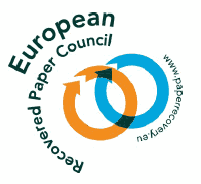 The European Recovered Paper Council (ERPC) has adopted a revised version of its deinking scorecard, first published in 2008. The scorecard assesses the deinkability of a printed product, based on the results of the widely-accepted “INGEDE Method 11” laboratory deinking test procedure, developed by the International Association of the Deinking Industry (INGEDE).
The European Recovered Paper Council (ERPC) has adopted a revised version of its deinking scorecard, first published in 2008. The scorecard assesses the deinkability of a printed product, based on the results of the widely-accepted “INGEDE Method 11” laboratory deinking test procedure, developed by the International Association of the Deinking Industry (INGEDE).
Printed paper products clearly contribute to the circular economy. Deinking, the removal of printing inks, is a major step in their recycling process. “This revised scorecard ensures that more products can be recycled to similar quality levels as the original product. Our joint efforts prove that the paper value chain is working every day to improve on the sustainability profile of its products, responding to the latest policy developments”, says Beatrice Klose, Secretary General of Intergraf, one of the ERPC signatories.
The scorecard takes into account five parameters: luminosity, colour, cleanliness, ink elimination and filtrate darkening. Aside from editorial updates and improvements, the revised version contains updates on terminology, fibre yield and – for one product category – luminosity threshold and target as well as ink elimination target. In addition, there is now a better distinction between “Magazines” and “Low ink coverage products”, and an assessment of print products with very low ink coverage. An annex listing exemptions from testing for specific products with good deinkability properties is expected to be approved at a later stage.
The new deinking scorecard is available at:
http://www.paperforrecycling.eu/publications/erpc-publications
For more information, please contact the ERPC Secretariat, Ulrich Leberle, at
+32 2 627 49 23, +32 479 90 59 21, This email address is being protected from spambots. You need JavaScript enabled to view it. or visit www.paperforrecycling.eu
The European Recovered Paper Council (ERPC) was set up as an industry self-initiative in November 2000 to monitor progress towards meeting the paper recycling targets set out in the 2000 European Declaration on Paper Recycling. Since then the commitments in the Declaration are renewed every five years. In 2001 the ERPC committed itself to meeting and maintaining both a voluntary recycling rate target of 70% in the EU27 plus Switzerland and Norway by 2015 as well as qualitative targets in areas such as waste prevention, ecodesign, and research and development. In 2015, Members of the ERPC are ACE, CEPI, CITPA, EMFA, ERPA, ETS, FEPE, INGEDE, INTERGRAF. Supporters are EuPIA, FINAT and RADTECH Europe. The European Commission, DG Environment and DG Enterprise, are permanent observers to the ERPC.
European paper industry partners with Pöyry
 The Confederation of European Paper Industries (CEPI) is pleased to announce a new partnership with Pöyry. The partnership will allow CEPI and Pöyry to work more closely together, particularly in the areas of innovation and bioeconomy. In addition, it will reinforce Pöyry’s presence both at the European Paper Week as well as other events organised by CEPI.
The Confederation of European Paper Industries (CEPI) is pleased to announce a new partnership with Pöyry. The partnership will allow CEPI and Pöyry to work more closely together, particularly in the areas of innovation and bioeconomy. In addition, it will reinforce Pöyry’s presence both at the European Paper Week as well as other events organised by CEPI.
Pöyry is an international consulting and engineering company providing services across the full project lifecycle and helping to solve the challenges faced by the world’s toughest industries. By becoming a CEPI Partner, Pöyry joins Buckman, Omya and Voith. “We are very excited to have Pöyry on board and we very much look forward to a fruitful collaboration”, says CEPI Director General Marco Mensink.
CEPI’s partnership programme is currently open to machine and chemical suppliers active in the pulp, paper or board industry with a direct link to paper manufacturing. It was first launched in 2011 and aims at exchanging technical information and expertise as well as promoting common interests.
For more information, please contact Annie Xystouris at This email address is being protected from spambots. You need JavaScript enabled to view it. mobile: +32(0)486 243 642.
CEPI aisbl - The Confederation of European Paper Industries
The Confederation of European Paper Industries (CEPI) is a Brussels-based non-profit organisation regrouping the European pulp and paper industry and championing industry’s achievements and the benefits of its products. Through its 18 member countries (17 European Union members plus Norway) CEPI represents some 515 pulp, paper and board producing companies across Europe, ranging from small and medium sized companies to multi-nationals, and 940 paper mills. Together they represent 23% of world production.
About Pöyry
Pöyry is an international consulting and engineering company. We serve clients globally across the energy and industrial sectors and provide local services in our core markets. We deliver management consulting and engineering services, underpinned by strong project implementation capability and expertise. Our focus sectors are power generation, transmission & distribution, forest industry, chemicals & biorefining, mining & metals, transportation and water. Pöyry has an extensive local office network employing about 6,000 experts. Pöyry's net sales in 2014 were EUR 571 million and the company's shares are quoted on NASDAQ OMX Helsinki (Pöyry PLC: POY1V).
Website: http://www.poyry.com/
Newly-formed Bioeconomy Alliance calls for EU action
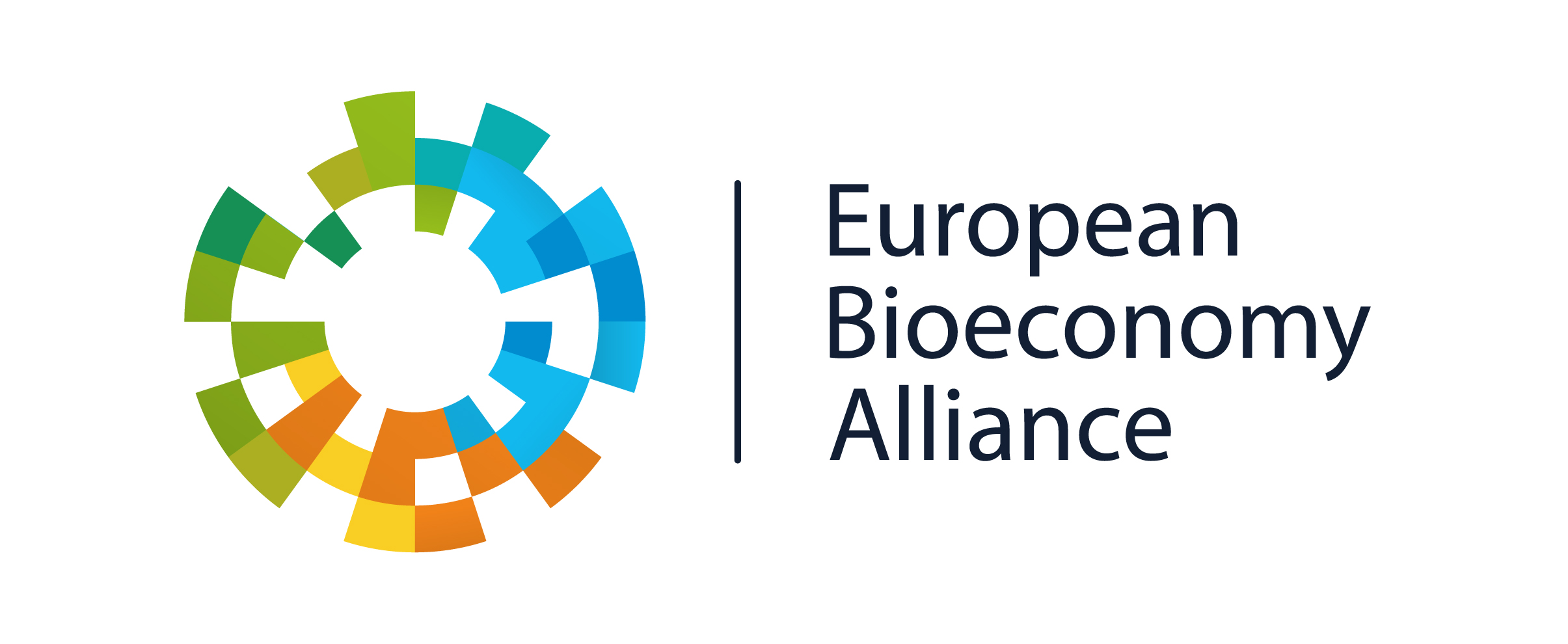 Creating a world-leading bioeconomy in the European Union requires bold political moves. On the occasion of its launch at the European Parliament on 4 February, the European Bioeconomy Alliance (EBA) calls for more predictable policies leading to a long-term strategy for a competitive, dynamic and sustainable bioeconomy in Europe.
Creating a world-leading bioeconomy in the European Union requires bold political moves. On the occasion of its launch at the European Parliament on 4 February, the European Bioeconomy Alliance (EBA) calls for more predictable policies leading to a long-term strategy for a competitive, dynamic and sustainable bioeconomy in Europe.
Developing the bioeconomy is only feasible if the European Union provides a holistic, coherent and harmonised framework in a range of policy fields: agriculture, forestry, marine, industrial, climate, environment, energy, research, innovation and regional development. The EU needs to act on the following four main fronts in particular, in order to help Europe become a leader in the bioeconomy:
- Implement priority recommendations from the Lead Market Initiative on bio-based products. This will not only create new markets and jobs but also stimulate economic recovery, focusing on: access to feedstock, research, development and innovation, access to markets, public procurement and communication.
- Encourage member states to implement measures to i) increase agricultural and forestry productivity and soil fertility in a sustainable way and ii) facilitate mobilisation and access to renewable feedstock at competitive prices.
- Address barriers to investment in first commercial operations, such as biorefineries in Europe. The Public Private Partnership on Bio-based Industries is a first step in the right direction and should facilitate and catalyse other European and national and regional financing sources.
- Engage with civil society, together with farmers, forest owners and industry, to encourage the debate on shaping a more competitive, sustainable bioeconomy for Europe.
EBA’s vision is to help establish a more competitive, innovative, energy-secure and sustainable Europe, separating economic growth from a reliance on imported fossil sources, resource depletion, and environmental impact. EBA fully supports both the European Commission’s work on developing an EU bioeconomy as well as on-going efforts at member state and regional level to implement local strategies. In addition, EBA entirely supports the recent establishment of the European Parliament intergroup on “climate change, biodiversity and sustainable development” and its subgroup on the bioeconomy.
Over the next decades, the bioeconomy will play an increasingly important role in boosting Europe’s economy by revitalising rural and coastal areas and disused industrialised sites while providing more growth and jobs. According to the European Commission, the European bioeconomy is worth nearly €2 trillion and provides more than 22 million jobs to EU citizens.
The bioeconomy is not a niche sector; it encompasses the sustainable production of renewable resources and their conversion into food, feed, fibres, materials, chemicals and bioenergy through efficient and/or innovative technologies, which provides widespread economic, environmental and societal benefits. Therefore, the EBA calls for the bioeconomy development to be set as a priority in the Commission’s new €315 billion investment plan as well as in national and regional measures, to help ensure Europe’s sustainable economic recovery.
For more information please contact This email address is being protected from spambots. You need JavaScript enabled to view it..
The EBA is an informal alliance of leading European organisations active in the bioeconomy. Its members are:
- BIC - Bio-based Industries Consortium
- CEFS - European Association of Sugar Producers
- CEPF - Confederation of European Forest Owners
- CEPI - Confederation of European Paper Industries
- COPA - COGECA - European Farmers and European agri-cooperatives
- ePURE - European Renewable Ethanol Producers Association
- EuropaBio - The European Association for Bioindustries
- EUBP - European Bioplastics
- FEDIOL - The EU Vegetable Oil & Proteinmeal Industry
- FTP - Forest-based Sector Technology Platform
- PFP - Primary Food Processors
- Starch Europe - European Starch Industry Association
Paper or Digital? The citizen’s right to choose
Launch of the European Keep Me Posted campaign website
 Keep Me Posted EU is a campaign promoting the citizen’s right to choose how they receive important information – paper, digital or both, without being penalised. This information includes tax forms, election documents as well as bills and statements from service providers. It is not an anti-digital campaign but a pro-citizen-choice campaign promoting the inclusion of vulnerable consumers at European level.
Keep Me Posted EU is a campaign promoting the citizen’s right to choose how they receive important information – paper, digital or both, without being penalised. This information includes tax forms, election documents as well as bills and statements from service providers. It is not an anti-digital campaign but a pro-citizen-choice campaign promoting the inclusion of vulnerable consumers at European level.
Central to the campaign is the Keep Me Posted EU Pledge, which European organisations and Members of the European Parliament (MEPs) are called upon to adopt.1 The launch of this campaign could not be timelier as research shows that in 2013 a remarkable 21% of European households still had no internet access.
Since its creation in July of this year, the campaign has rapidly gathered momentum. It has secured the support of consumer groups and organisations representing citizens that may be disadvantaged by a lack of choice or simply do not agree with the fact that choice has been taken away from them.
The growing list of supporters includes European consumer organisations, European associations representing older citizens and the disabled as well as unions. The print value chain is represented by FEPE, PostEurop, CEPI, EuPIA and Intergraf.
Béatrice Klose, Secretary General of Intergraf is very encouraged by the progress made in such a short time: “The fact that we have gained so many enthusiastic partners since start-up shows that there is a genuine need and desire for this type of initiative. We are confident that more partners will join us as the campaign’s message spreads.”
Today marks the launch of the campaign’s website www.keepmepostedeu.org. It is regularly updated with news on developments in European countries regarding the trend to push citizens towards entirely paperless communication and efforts to support citizen choice. Users can subscribe to our newsletter to keep informed on the campaign’s progress, research concerning consumers’ preferences and developments across Europe. Supporters of the initiative are encouraged to get involved in a variety of ways including petitioning MEPs and service providers and sharing personal experiences.
The EU campaign is inspired by a similar initiative in the UK. Drawing on his experience from the Keep Me Posted UK campaign, David Gold, Head of Public Affairs at Royal Mail explains further how the campaign can even benefit the organisations that are being targeted: “Service providers are now starting to see the merit of being associated with this type of campaign. With 81% of adults wanting to choose how they receive information, giving consumers a choice in how they are communicated with, rather than pushing customers online by default, is not only the right thing to do, but better for their business.”
In 2015 the campaign will be launched publicly with an event at the European Parliament encouraging its members to sign the pledge.
For more information about the Keep Me Posted EU campaign please contact This email address is being protected from spambots. You need JavaScript enabled to view it.
______________________
1The Keep Me Posted pledge is available here: http://www.keepmepostedeu.org/the-campaign/
World Economic Forum Project on the Circular Economy to Include EcoDesign Pilot from CEPI
 Paper will show the way for other materials in ecodesign
Paper will show the way for other materials in ecodesign
The World Economic Forum’s project on the circular economy (Project MainStream) has chosen the Confederation of European Paper Industries (CEPI) to contribute to one of the project’s three pilots for advancing circular thinking.
“An excellent track record, the right mindset of wanting to continuously raise the bar and world class knowledge in recycling were the reasons for which Project MainStream chose the CEPI pilot as a contibutor”, says Johnson Yeh, Head of Circular Economy Initiatives at the World Economic Forum.
The pilot’s objective is to consolidate existing pieces of design tools into a set of user-friendly, universal ecodesign rules for all value added elements of the paper and board value chain. The pilot, running from January 2015 for 12 months, intends to create a self-enforcing mechanism of speedy adoption of new ecodesign rules, thanks to commitments by businesses.
The World Economic Forum’s Project MainStream was launched in January this year, during the World Economic Forum Annual Meeting in Davos.The project will enable annual savings of up to $10bn for the value chain, according to World Economic Forum estimations.
“Paper is a perfect place for Project MainStream to start, given paper’s currently high recycling rate and complete infrastructure for recycling. By establishing proof-of-concept with ecodesign rules for paper, the same lesson can be applied to other materials,” says Yeh.
Although originally 100% recyclable, paper is converted by many downstream industries adding auxiliary materials, such as tapes, adhesives and printing inks. These materials will later return to paper recycling mills when closing the loop, as they cannot be sorted from paper in the dry-sorting steps before they reach paper mills. “Simple ecodesign rules for paper products would give the essential guidance for designers and developers without limiting innovation and hampering the introduction of new techniques. This would be a system-level approach, identifying the root cause and preventing problems”, says Jori Ringman, Sustainability Director at CEPI.
The goal of a circular economy is to move towards a resource efficient use of materials throughout the life cycle, beyond production and consumption. In a circular economy, collected waste and by-products become new raw materials. Whereas the European paper industry has already achieved very high recycling rates of 72%, a more systemic approach supported by ecodesign will allow further improvement of the performance in the sector. “Ecodesign could reduce the overall fibre need as well as improve the safe recycling of fibres, while improving opportunities for reusing water and by-streams of the paper and paperboard process in industrial symbiosis”, says Ringman.
The proposed project is also linked to other global sustainability initiatives, notably Strategic Approach to International Chemicals Management (SAICM) by the United Nations Environment Programme (UNEP) and to Sound Material Management (SMM) policies.
For more information, please contact Jori Ringman at This email address is being protected from spambots. You need JavaScript enabled to view it., mobile: +32 478 255 070.
CEPI aisbl - The Confederation of European Paper Industries
The Confederation of European Paper Industries (CEPI) is a Brussels-based non-profit organisation regrouping the European pulp and paper industry and championing industry’s achievements and the benefits of its products. Through its 18 member countries (17 European Union members plus Norway) CEPI represents some 515 pulp, paper and board producing companies across Europe, ranging from small and medium sized companies to multi-nationals, and 940 paper mills. Together they represent 23% of world production.
European Paper Week – It’s all about competitiveness
European pulp and paper industry concludes successful event
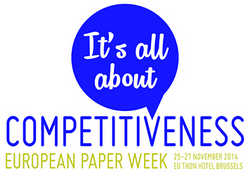 The European pulp and paper industry successfully concluded its 16th European Paper Week, titled “It’s all about competitiveness”. The three-day event brought together over 350 participants from the sector, related organisations as well as the European institutions, providing a high-level discussion and networking platform.
The European pulp and paper industry successfully concluded its 16th European Paper Week, titled “It’s all about competitiveness”. The three-day event brought together over 350 participants from the sector, related organisations as well as the European institutions, providing a high-level discussion and networking platform.
Sessions not only dealt with the competitiveness of industry, but also the overall competitiveness of the EU economy. Energy costs and regulatory burden were key themes.
The focus of the Juncker Commission on jobs, growth and competitiveness is crucial for Europe. “This week showed the new European Commission launching a 300 billion euro investment package, putting a focus on better regulation and assessing the member states’ budgets. We call upon the European Commission to follow these actions with a new single project for Europe – Competitiveness,” said Gary McGann, CEPI (Confederation of European Paper Industries) chairman.
CEPI launched its PACT with EU policy makers, a call for cooperation with the Juncker Commission. It underlines the industry’s 5 billion euro investments in Europe over the next three years and the strong need for adequate policymaking to enable this.
CEPI further announced its participation in a joint project on ecodesign for paper products with the prestigious World Economic Forum.
Throughout the event, the industry reaffirmed its positioning as a strategic sector playing an active role in the bioeconomy. The sector remains focused on innovation as the way forward. Renowned economist Professor Mariana Mazzucato enticed a packed audience with her views on the government’s role in innovation, or the “entepreuneurial state”.
”Following the CEPI 2050 roadmap and Two Team project last year, we have helped build the bio-based industries Public Private Partnership and launched consortia to develop the Two Team concepts. Professor Mazzucato shows us the next step ahead – the design of EU innovation policy, post 2020,” said Marco Mensink, CEPI Director General.
For more information please contact Annie Xystouris, at This email address is being protected from spambots. You need JavaScript enabled to view it. or +32 2 627 49 24.
PACT with EU policy makers can be found at: http://www.cepi.org/node/18565
About European Paper Week
European Paper Week is one of the most important and respected events of the pulp and paper industry. It brings together key players and representatives from across the industry, related sectors and the European institutions, providing an annual platform for high-level debate on the issues that really matter to the paper industry. Its success has been reflected in its growing attendance. This year the event took place in the Thon Hotel EU in Brussels.
Twitter: @EUPaperWeek #epw14
CEPI aisbl - The Confederation of European Paper Industries
The Confederation of European Paper Industries (CEPI) is a Brussels-based non-profit organisation regrouping the European pulp and paper industry and championing industry’s achievements and the benefits of its products. Through its 18 member countries (17 European Union members plus Norway) CEPI represents some 515 pulp, paper and board producing companies across Europe, ranging from small and medium sized companies to multi-nationals, and 950 paper mills. Together they represent 23% of world production.
ERPC Launches Call for Candidates for European Paper Recycling Award 2013
 Paper recycling initiatives are invited to apply for the fourth European Paper Recycling Award. NGOs, educational institutes, local authorities and industry have implemented many innovative projects to enhance paper recycling all over Europe but these initiatives are generally not well known. By promoting these initiatives and raising their profile with an award the European Recovered Paper Council (ERPC) recognises these efforts and hopes to inspire others to copy good practices. The award will identify projects, initiatives and campaigns that contribute to Europe‟s sustainability through activities supporting paper recycling.
Paper recycling initiatives are invited to apply for the fourth European Paper Recycling Award. NGOs, educational institutes, local authorities and industry have implemented many innovative projects to enhance paper recycling all over Europe but these initiatives are generally not well known. By promoting these initiatives and raising their profile with an award the European Recovered Paper Council (ERPC) recognises these efforts and hopes to inspire others to copy good practices. The award will identify projects, initiatives and campaigns that contribute to Europe‟s sustainability through activities supporting paper recycling.
“Recycling is the key to achieving sustainability in production and consumption in Europe. Paper recycling, in particular, contributes significantly to green growth, combating climate change and improving resource efficiency. This makes a valuable contribution to the environment”, explains Beatrice Klose, Chairperson of the ERPC.
Eligible projects, initiatives or campaigns will be evaluated based on the following criteria:
• Relevance and originality
• Achievements
• Possibility to reproduce the project
• Cost effectiveness
There are two award categories:
• Information & Education
• Technology improvement & R&D
The initiatives may be ongoing or completed, but they must already have started; however, not before January 2009. All entries must be submitted by Friday 28 June 2013 before midday Brussels time. To apply please go to www.paperforrecycling.eu Should you need some inspiration, the website also contains information from past awards.
An independent jury from across Europe will judge the entries in each category. The jury includes representatives from the European institutions as well as civic organisations and NGOs. European wide recognition of the winning candidate‟s efforts will be accompanied by an original piece of paper artwork, which will be officially handed over to the winners in an award ceremony at the European Parliament in Brussels.
Two Teams break through - CEPI applies new method to innovation
CEPI – the Confederation of European Paper Industries – is giving innovation a head start by launching the Two Team Project. It consists of two competing teams that include experts, scientists, manufacturers, suppliers and representatives of the pulp and paper industry and other sectors. Applying a unique method of open innovation, both teams are set to identify breakthrough concepts of technologies and processes that make the current pulp and paper manufacturing process more efficient and create more value.
Breakthrough technologies are at the heart of CEPI’s ‘2050 Roadmap to a low-carbon bio-economy’ report. A successful delivery on the two objectives of the roadmap – namely 80% decarbonisation of the industry and 50% value creation in 2050 – is only possible when breakthrough technologies are available by 2030.
The teams are urged to think out of the box, outside their comfort zone. The final concepts will need to be creative, innovative and imaginative. Breakthrough technologies are new concepts; new ways of thinking that go beyond current borders.
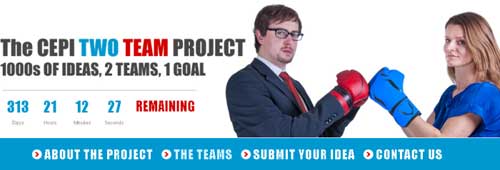
Submit your ideas
Both teams are looking for maximum support from passionate stakeholders within the pulp and paper industry, but also from beyond the sector. Everyone with a creative idea and an enthusiastic mind-set is called upon to submit ideas and to contribute to designing the future pulp and paper mill.
Today’s innovation model is fragmented. Innovative research takes place at companies and universities on a daily basis. However, only a small percentage is used in products or deployed in industrial processes. The Two Team Project uses open innovation - sharing ideas across companies, research institutes, academic institutions and public authorities - to generate new concepts and solutions efficiently.
In November this year, at least four breakthrough technology concepts will be delivered. The jury – composed of CEOs and high-level European officials – will select the winning concept. CEPI’s Annual Meeting at European Paper Week 2013 will unveil the winner.
Gather your ideas for the most efficient pulp and paper mill and submit them today at www.unfoldthefuture.eu
Intergraf takes on ERPC chairmanship
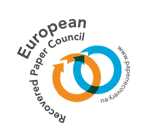 The European Recovered Paper Council (ERPC) is pleased to announce the appointment of Beatrice Klose as next chairperson. Ms Klose is the Secretary General of Intergraf - the European Association representing print and digital communications, one of the member organisations of the ERPC. She started her ERPC chairmanship on 1 January 2013 and will keep the position until end 2014.
The European Recovered Paper Council (ERPC) is pleased to announce the appointment of Beatrice Klose as next chairperson. Ms Klose is the Secretary General of Intergraf - the European Association representing print and digital communications, one of the member organisations of the ERPC. She started her ERPC chairmanship on 1 January 2013 and will keep the position until end 2014.
 The ERPC was set up after the successful launch of the first „European Declaration on Paper Recovery‟ as an industry owninitiative in November 2000 with the aim to monitor the progress made towards meeting the targets set out in the European Declaration. In 2011 the industry committed itself to meet and maintain a voluntary paper recycling rate target of 70% in EU 27 plus Switzerland and Norway by 2010, which is higher than in any other region in the world, and to pursue qualitative targets in areas such as waste prevention, ecodesign, and research and development.
The ERPC was set up after the successful launch of the first „European Declaration on Paper Recovery‟ as an industry owninitiative in November 2000 with the aim to monitor the progress made towards meeting the targets set out in the European Declaration. In 2011 the industry committed itself to meet and maintain a voluntary paper recycling rate target of 70% in EU 27 plus Switzerland and Norway by 2010, which is higher than in any other region in the world, and to pursue qualitative targets in areas such as waste prevention, ecodesign, and research and development.
“The ERPC has been very successful in boasting paper recovery and recycling rates and in improving the quality of paper for recycling in Europe. I intend to continue this line of work and to preserve the valuable contribution of the value chain to green growth and job creation in Europe”, said Ms Klose.
Ms Klose is 43 years old, of German origin and graduated with a double degree from the University of Osnabrück and the Ecole Supérieure de Commerce in Poitiers. Beatrice has lived and worked in Germany, the US, France and Belgium. Prior to her work at Intergraf she worked for the German company Mannesmann in their liaison office in Brussels.
